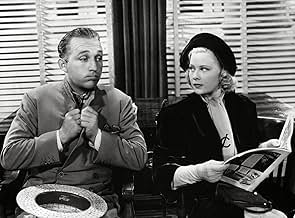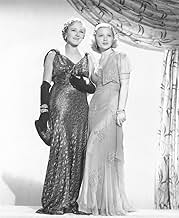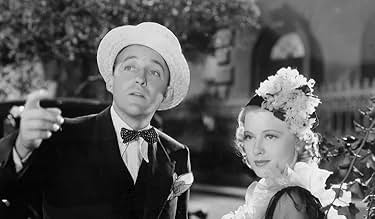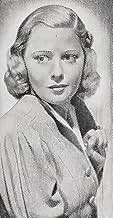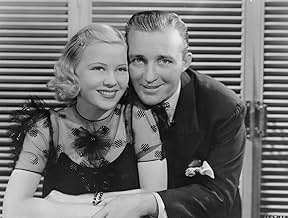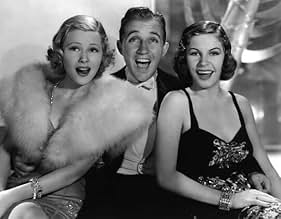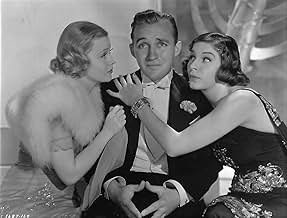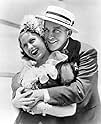IMDb RATING
6.4/10
300
YOUR RATING
According to the will of an eccentric millionaire, one of four randomly chosen strangers will become his heir if he/she can double $5000 by honest means.According to the will of an eccentric millionaire, one of four randomly chosen strangers will become his heir if he/she can double $5000 by honest means.According to the will of an eccentric millionaire, one of four randomly chosen strangers will become his heir if he/she can double $5000 by honest means.
Featured reviews
DOUBLE OR NOTHING (Paramount, 1937), directed by Theodore Reed, is an enjoyable, but not particularly original, musical-comedy with a typical story about how found money can change or ruin a person's life. Similar in ways to Paramount's earlier IF I HAD A MILLION (1932), this production focuses primarily on four people in one simple plot instead of separate episodes dealing with different central characters in ten minute segments. It also capitalizes on the quite common rich girl-poor boy theme and setting it to musical interludes.
The film begins with a couple of men walking about town purposely dropping wallets obtaining $100 bills on the sidewalks and over the fences. Numerous people find it and go about their way, followed by a lone dog picking up the wallet by his mouth, trailing around until he locates "Lefty" Boylan (Bing Crosby), found singing on the stool in a diner while waiting for his meal. Instead of keeping the money, Lefty encounters the address in the wallet, and although he could use the money, he decides to do the correct thing and return it to the rightful owner. Entering a lawyer's office, Lefty finds himself being seated along with three other people, Liza Lou Lane (Martha Raye), a former burlesque entertainer, "Half Pint" (Andy Devine), a tramp, and John Pederson (William Frawley), a gambler. These four turn out to be the only ones honest enough to not take the money and run. They then learn from an attorney the purpose of the wallets and of a last will and testament from a deceased millionaire who wants to prove that there are still intelligent and honest people left in the world, and as for their honesty, they are each rewarded $5,000 with the agreement that the first one to double that gift legitimately within thirty days will get to inherit a million dollars, or else, acquire nothing. The foursome have their own individual ideas on how to double their money and agree they should divide half of the estate among others. Lefty, an unemployed singer, decides to use his good fortune and open up a night club featuring entertainment acts. However, situations arise when the deceased millionaire's brother, Jonathan Clark (Samuel S. Hinds), feeling cheated of his inheritance, schemes to foil these people's plans, especially in using his pretty daughter, Victoria Clark (Mary Carlisle), to romance Lefty while his younger son, Egbert (William Henry) to do the same with Liza Lou.
In between the plot comes a handful of good listenable tunes, scored by Arthur Freed, Burton Lane, Johnny Burke, Arthur Johnston, Al Siegel and Sam Coslow, including: "Double or Nothing" (sung by chorus during opening credits); "Smarty" (sung by Bing Crosby, accompanied by a singing chef, played by Alfonse Berg); "All You Have to Do Is Dance" (sung by Crosby to Mary Carlisle, with brief dance solo by a policeman, played by Jimmy Notaro); "It's the Natural Thing to Do" (sung by Crosby to Carlisle); "It's On, It's Off" (sung by Martha Raye); "The Moon Got In My Eye" (sung by Crosby); "Listen, My Children" (sung by Martha Raye); "Swan Waltz" (instrumental); "It's On, It's Off" (reprise by Raye); "Double or Nothing," "Double or Nothing" (reprise/ sung by chorus); "Clarinet Virtuoso" (performed by Ames and Arno); "The Moon Got In My Eye" (reprise, sung by Crosby); The Calgary Brothers Comedy Act (performed by Steve and Andre Calgary) followed by them singing "The Moon Got In My Eye," "After You" (sung by Frances Faye, Martha Raye, Bing Crosby and Harry Barris) and "It's the Natural Thing to Do" (reprise by Crosby). Of the Crosby tunes, the ones that come off best are "It's the Natural Thing to Do" and "The Moon Got In My Eye," with the latter beautifully performed instrumentally by a sing and humming band of twenty voices in the place of an orchestra. A novel idea. On the funny side, Martha Raye, a burlesque dancer, finds herself unable to control herself by doing a striptease act every time she hears the music to "It's On, It's Off," and at one point, continues to sing under the bubbles while submerging under water during a police raid. For the finale in the night club variety act comes the jive singing of Frances Faye and Martha Raye to the tune "After You." With their last names sounding alike (Faye and Raye), so does their loud vocalizing.
The supporting players include: Benny Baker as The Sailor; Fay Holden as Martha Sewell Clark; Walter Kingsford as Dobson; Gilbert Emery as Mitchell; John Gallaudet as Johnny Rutherford; and Harry Barris, (a familiar face in numerous Crosby musicals, mainly because he was part of his "Rhythm Boys" singing trio in his early days), playing an orchestra leader. Resident Hollywood drunks Charles Irwin and Arthur Housman can be seen briefly in the golf course scene, which is highlighted by Martha Raye opening her big mouth, belting out a giant cry that stops her short when a flying golf ball enters her mouth, causing her to swallow it.
Bing Crosby and his doll-faced blonde co-star, Mary Carlisle, make a fine on-screen couple. First paired in COLLEGE HUMOR (1933), they reunited for the third and final time in DOCTOR RHYTHM (1938), in which Andy Devine, who appears in DOUBLE OR NOTHING, appears with them once more.
The story used in DOUBLE OR NOTHING appears to be more interesting than the somewhat overlong musical and comedy acts performed in the night club sequence shortly before the close of this 94 minute production, but the good tunes, lavish sets and fine performances keep this from being just another mediocre musical. Rarely seen in recent years, it's worth rediscovering again. (***)
The film begins with a couple of men walking about town purposely dropping wallets obtaining $100 bills on the sidewalks and over the fences. Numerous people find it and go about their way, followed by a lone dog picking up the wallet by his mouth, trailing around until he locates "Lefty" Boylan (Bing Crosby), found singing on the stool in a diner while waiting for his meal. Instead of keeping the money, Lefty encounters the address in the wallet, and although he could use the money, he decides to do the correct thing and return it to the rightful owner. Entering a lawyer's office, Lefty finds himself being seated along with three other people, Liza Lou Lane (Martha Raye), a former burlesque entertainer, "Half Pint" (Andy Devine), a tramp, and John Pederson (William Frawley), a gambler. These four turn out to be the only ones honest enough to not take the money and run. They then learn from an attorney the purpose of the wallets and of a last will and testament from a deceased millionaire who wants to prove that there are still intelligent and honest people left in the world, and as for their honesty, they are each rewarded $5,000 with the agreement that the first one to double that gift legitimately within thirty days will get to inherit a million dollars, or else, acquire nothing. The foursome have their own individual ideas on how to double their money and agree they should divide half of the estate among others. Lefty, an unemployed singer, decides to use his good fortune and open up a night club featuring entertainment acts. However, situations arise when the deceased millionaire's brother, Jonathan Clark (Samuel S. Hinds), feeling cheated of his inheritance, schemes to foil these people's plans, especially in using his pretty daughter, Victoria Clark (Mary Carlisle), to romance Lefty while his younger son, Egbert (William Henry) to do the same with Liza Lou.
In between the plot comes a handful of good listenable tunes, scored by Arthur Freed, Burton Lane, Johnny Burke, Arthur Johnston, Al Siegel and Sam Coslow, including: "Double or Nothing" (sung by chorus during opening credits); "Smarty" (sung by Bing Crosby, accompanied by a singing chef, played by Alfonse Berg); "All You Have to Do Is Dance" (sung by Crosby to Mary Carlisle, with brief dance solo by a policeman, played by Jimmy Notaro); "It's the Natural Thing to Do" (sung by Crosby to Carlisle); "It's On, It's Off" (sung by Martha Raye); "The Moon Got In My Eye" (sung by Crosby); "Listen, My Children" (sung by Martha Raye); "Swan Waltz" (instrumental); "It's On, It's Off" (reprise by Raye); "Double or Nothing," "Double or Nothing" (reprise/ sung by chorus); "Clarinet Virtuoso" (performed by Ames and Arno); "The Moon Got In My Eye" (reprise, sung by Crosby); The Calgary Brothers Comedy Act (performed by Steve and Andre Calgary) followed by them singing "The Moon Got In My Eye," "After You" (sung by Frances Faye, Martha Raye, Bing Crosby and Harry Barris) and "It's the Natural Thing to Do" (reprise by Crosby). Of the Crosby tunes, the ones that come off best are "It's the Natural Thing to Do" and "The Moon Got In My Eye," with the latter beautifully performed instrumentally by a sing and humming band of twenty voices in the place of an orchestra. A novel idea. On the funny side, Martha Raye, a burlesque dancer, finds herself unable to control herself by doing a striptease act every time she hears the music to "It's On, It's Off," and at one point, continues to sing under the bubbles while submerging under water during a police raid. For the finale in the night club variety act comes the jive singing of Frances Faye and Martha Raye to the tune "After You." With their last names sounding alike (Faye and Raye), so does their loud vocalizing.
The supporting players include: Benny Baker as The Sailor; Fay Holden as Martha Sewell Clark; Walter Kingsford as Dobson; Gilbert Emery as Mitchell; John Gallaudet as Johnny Rutherford; and Harry Barris, (a familiar face in numerous Crosby musicals, mainly because he was part of his "Rhythm Boys" singing trio in his early days), playing an orchestra leader. Resident Hollywood drunks Charles Irwin and Arthur Housman can be seen briefly in the golf course scene, which is highlighted by Martha Raye opening her big mouth, belting out a giant cry that stops her short when a flying golf ball enters her mouth, causing her to swallow it.
Bing Crosby and his doll-faced blonde co-star, Mary Carlisle, make a fine on-screen couple. First paired in COLLEGE HUMOR (1933), they reunited for the third and final time in DOCTOR RHYTHM (1938), in which Andy Devine, who appears in DOUBLE OR NOTHING, appears with them once more.
The story used in DOUBLE OR NOTHING appears to be more interesting than the somewhat overlong musical and comedy acts performed in the night club sequence shortly before the close of this 94 minute production, but the good tunes, lavish sets and fine performances keep this from being just another mediocre musical. Rarely seen in recent years, it's worth rediscovering again. (***)
Among a slew of films Bing Crosby made for Paramount in the mid-thirties,"Double or Nothing" is a reminder that Bing Crosby was more than just a crooner. He had a flair for acting, a natural easy-going charm that came through on screen. In this cleverly contrived tale, he's one of four candidates for a fortune who's challenged to take a wad of cash and double it in thirty days. That's a headache for heiress Mary Carlisle who -- and this should come as no surprise -- ultimately falls for him. Martha Raye, Andy Devine and William Frawley as Bing's fellow fortune-hunters contribute stereotypical schtick, leading up to a night at an unlikely night club and an even less probable scenery-shifting send-off. Okay, the movie doesn't always make sense. But a good yarn, bright, brash dialogue and the youthful Bing make it fun to watch.
in 1937, paramount films, along with other studios, was in deep trouble in the recession. bing crosby was paramount's main source of easy money. the public then was willing to see anything with bing in it, or for that matter, hear him on records and on the radio. in "double or nothing", bing gave them some of all three media. four crosby-type numbers, "smarty", "the natural thing to do", "moon got in my eyes","all you wanna do is dance" which crosby does with that effortless, casual insouciance for which he was so famous. at that time, crosby's kraft music hall was one of the top radio shows, and the night club scene had bing emceeing just as he did on radio. pretty mary carlisle is the love interest, and a capable cast of martha raye (great in "it's on, it's off"), bill frawley, andy devine round out the foursome, with bing, trying to win the million dollar jackpot, courtesy of a multi-millionaire's whimsy. samuel s. hinds (jimmy stewart's father in "it's a wonderful life") plays one of his hundreds of supporting roles, as bing & co's adversary. not a "great" movie, but a thoroughly enjoyable one.
The film begins with some lawyers walking about town deliberately dropping wallets and purses so that someone will find them. Each is filled with $100 and an address. Four folks return the money and the four are invited to the reading of a very eccentric will. They will each be given $5000 and the first to double this HONESTLY will become heir to a $1,000,000 fortune. And, if none of them can double the money within 30 days, then the money goes to the dead man's brother and his family.
The brother, not surprisingly, is NOT happy about this scheme but instead of voicing his anger towards the four, he convinces his family to pretend to want to help them. He tells them that he doesn't need or want the money and asks them all to dinner. And, in turn, the family convince several of them to invest in stupid money-losing schemes. The problem is that the daughter (Mary Carlisle) starts to feel sorry for them--particularly Lefty (Bing Crosby).
The same DVD that contains "Double or Nothing" also contains "Waikiki Wedding". Both are Bing Crosby films and both feature Martha Raye prominently. I was NOT thrilled to see this, as Raye's brash manner is the opposite of Crosby's gentle image. Additionally, her singing is also the opposite--making up for her lack of a decent voice by increasing her volume--whereas Crosby was smooth made his songs seem natural and likable. As a result, practically every scene with her seemed like a chore to watch and greatly detracted from an otherwise pleasant story. Because of this, the film loses a few points. It also loses a few points for the final portion of the film--with too many weird review acts as well as a finale that in mindblowingly weird (such as the 'sing band') and impossible--especially with only $5000 to spend!
The brother, not surprisingly, is NOT happy about this scheme but instead of voicing his anger towards the four, he convinces his family to pretend to want to help them. He tells them that he doesn't need or want the money and asks them all to dinner. And, in turn, the family convince several of them to invest in stupid money-losing schemes. The problem is that the daughter (Mary Carlisle) starts to feel sorry for them--particularly Lefty (Bing Crosby).
The same DVD that contains "Double or Nothing" also contains "Waikiki Wedding". Both are Bing Crosby films and both feature Martha Raye prominently. I was NOT thrilled to see this, as Raye's brash manner is the opposite of Crosby's gentle image. Additionally, her singing is also the opposite--making up for her lack of a decent voice by increasing her volume--whereas Crosby was smooth made his songs seem natural and likable. As a result, practically every scene with her seemed like a chore to watch and greatly detracted from an otherwise pleasant story. Because of this, the film loses a few points. It also loses a few points for the final portion of the film--with too many weird review acts as well as a finale that in mindblowingly weird (such as the 'sing band') and impossible--especially with only $5000 to spend!
The story is contrived and start-stop-start in places, the night-club sequence has a lot of great touches but is perhaps overlong and the donkey-dressed stuntman was odd and unnecessary. Double or Nothing still makes for pleasant viewing. The sets are lavish, especially the lake set in It's On, It's Off, and the photography and direction are straightforward and efficiently organised. The music score has the right amount of lushness, energy and whimsy, complete with some fitting classical music, and the songs are great though not among the greatest tunes of any Bing Crosby film. The standouts are It's On, It's Off, Smarty and especially the heavenly The Moon Got in My Eyes. The choreography is lively and cleverly done, the water ballet forming It's On, It's Off is the most memorable but Ames and Amos' tango and the slow motion fight are worth looking out for as well. The dialogue crackles with wit and fits the term escapist entertainment just fine. There is a fair bit of nonsense in the goings-on but it is pleasant and part of the fun. Bing Crosby looks very comfortable here and his voice is as handsome as ever, The Moon Got in My Eyes is sung so beautifully by him and suits him like a glove. Mary Carlisle is charming, Andy Devine is amusing and William Frawley likewise. Martha Raye won't be for all tastes, her comedy can be quite farcical and not in the most subtle of ways but she looks as though she's having a whale of a time and despite having more to do she's not as emphatic as she was in Waikiki Wedding(though she was still fun in that too). Overall, good pleasant fun. 7/10 Bethany Cox
Did you know
- TriviaOne of over 700 Paramount Productions, filmed between 1929 and 1949, which were sold to MCA/Universal in 1958 for television distribution, and have been owned and controlled by Universal ever since; its earliest documented telecast took place in Seattle Tuesday 25 November 1958 on on KIRO (Channel 7); it was released on DVD 14 November 2006 as one of 5 titles in Universal's Bing Crosby Screen Legend Collection, and again 11 November 2014 as one of 24 titles in Universal's Bing Crosby Silver Screen Collection.
- Quotes
Jonathan Clark: Will you have a cocktail?
Liza Lou Lane: No. No alcohol, kid. I get a feelin'z good.
Vicki Clark: What's the matter with feeling good?
Liza Lou Lane: Oh, you don't know how good I can feel.
- ConnectionsEdited into Chop Suey (2001)
- SoundtracksDouble or Nothing
(uncredited)
Lyrics by Johnny Burke
Music by Victor Young
Played and sung by vocal group during opening credits.
Reprised at the Four Winds Club opening
Details
- Runtime
- 1h 30m(90 min)
- Color
- Aspect ratio
- 1.37 : 1
Contribute to this page
Suggest an edit or add missing content

